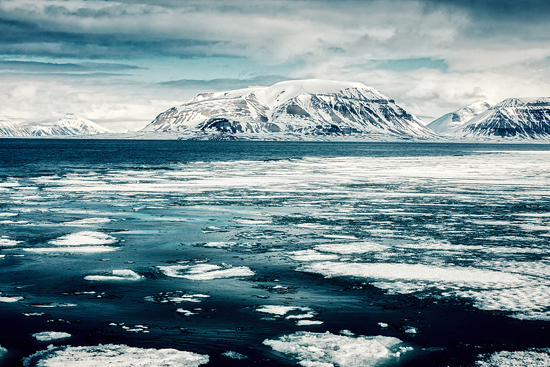Who Owns Santa’s Home?
CAS expert analyzes nations’ scrounging for Arctic Circle resources

The melting of the Arctic region’s ice has opened new shipping lanes in previously unnavigable waters, making the Arctic’s oil and gas resources easier to reach. Photo by Severin Sadjina
While the rest of us spent the spring blocking out memories of snow and cold, a slew of nations was scrambling to the top of the world, impelled by climate change and hoping for a piece of the Arctic Circle’s oil and gas reserves. One BU expert says their efforts could get ugly.
The background: as warmer temperatures melt the Arctic, they open new shipping lanes that make it easier to reach a place once sought only by daredevils like Admiral Richard E. Byrd. There’s already an Arctic Council, comprising the eight countries with land bordering the Circle—the United States, Russia, Canada, Iceland, Finland, and the three Scandinavian countries. Last month, the council granted observer status to six countries distant from the region: China, Japan, India, Italy, Korea, and Singapore.
The goal is to persuade the newcomers to buy into the council’s principles for governing the Arctic as climate change thaws a sure-to-be-beaten trail to its resources. William Keylor says there are legitimate worries about what will unfold way, way north of our border. Keylor, a College of Arts & Sciences professor of international relations and history, discussed the issue with BU Today.
BU Today: What national interests does the United States have in the future of the Arctic Circle?
Keylor: The most important American interests are economic. The region possesses about 10 percent of the unexploited petroleum reserves and about 20 percent of the unexploited natural gas reserves in the world. The melting of the polar ice will open up those potential resources for exploitation. Another national interest is to ensure unimpeded access to the new transportation routes in the Arctic Circle that will become navigable as the melting continues.
How significant is the move by Arctic Council members to admit nations far distant from the region as observers?
The decision of the eight members of the Arctic Council at its recent biannual meeting in Sweden to allow several observers reflected the reality that other non-Arctic nations, such as China, India, and Japan, will expect to participate in the exploitation of the new oil and gas reserves when that is possible. The “Arctic Eight” would find it very difficult to assert the right to form an exclusive oligopoly that would control the region’s energy resources.
Norway’s foreign minister says he hopes the observers will endorse the council’s principles. What are those?
The council has issued some rather vague principles that are mostly intended to ensure that the scramble for oil and gas will not result in international conflict and in the despoliation of the ecosystem in the region. The goal is to establish a multilateral, cooperative process for governing the opening of the region to economic development while protecting the environment.
With more countries interested in the Arctic Circle, is environmental exploitation a growing concern?
The danger of environmental degradation is definitely a source of concern. The United States has a history of enacting relatively stringent protections for the environment, but the temptation of abundant energy supplies could adversely affect that commitment.
Harvard lecturer Juliette Kayyem writes in a recent Boston Globe op-ed, “Russia owns the Arctic, or at least thinks so.” Who does and should own it?
Russia certainly has the strongest claim to “own” the Arctic, with Canada coming in a close second. The US claim derives entirely from the purchase of Alaska from Tsarist Russia in 1867, a deal that was very unpopular at the time.
What are the prospects for “cooperative stewardship of the region,” as Kayyem puts it?
The prospects of “cooperative stewardship” of the Arctic region will depend entirely on the willingness of the Arctic powers, and the observers they have invited to join the Arctic Council, to moderate their naked pursuit of national interest. There have been a number of cooperative agreements to prevent nuclear proliferation, to establish laws of war and the treatment of prisoners of war, etc. But some countries have refused to participate in such cooperative arrangements in order to preserve their freedom of action.
The United Nations Convention on the Law of the Sea, which entered into force in 1994, was ratified by 165 nations. But the United States refused to adhere to it. The President’s National Strategy for the Arctic Region, which was unveiled on May 10, committed his administration to work for US accession to the Convention. But since treaties must receive a two-thirds vote of the US Senate to become law, and since 34 Republican senators announced in the summer of 2012 that they would oppose ratification of the convention, it is unlikely that the United States will join.

Comments & Discussion
Boston University moderates comments to facilitate an informed, substantive, civil conversation. Abusive, profane, self-promotional, misleading, incoherent or off-topic comments will be rejected. Moderators are staffed during regular business hours (EST) and can only accept comments written in English. Statistics or facts must include a citation or a link to the citation.